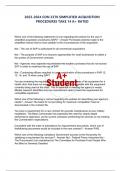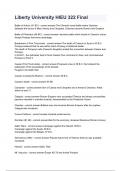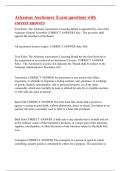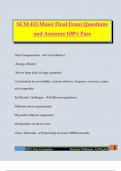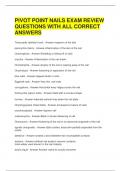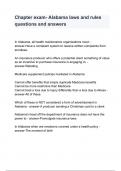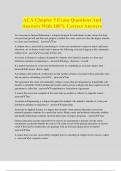IRO, Leiden University
,Index
Lecture 2: Epistemology & Ontology……………………………………..……………..
Lecture 3: Political Theory……………………………………………………………….
Lecture 4: Positivism & Behaviouralism…………………………………………………
Lecture 5: Rational Choice ………………………………………………………………
Lecture 6: Institutionalism ……………………………………………………………….
Lecture 7: Constructivism ………………………………………………………………..
Lecture 8: Marxism/ Feminism…………………………………………………………...
Lecture 9: Research Design………………………………………………………………
1
, Lecture 2: Epistemology & Ontology
Definition of ontology:
● Most broadly, ontology is the study of what there is, the study of what exists when
you are talking about specific questions about if something exists
● Ontologies are theories of being/ theories of existing
● There is only one truth
● Ontological questions include:
- What is the nature of reality?
- What “really” exists?
- Is there a world ‘out there’ independent of our experiences?
Applied ontological questions:
● Ontological questions don’t have to be abstract. They can be specific too:
- If a tree falls in a forest, and no one is nearby to hear it, does it make a sound?
- Are there numbers? Or are they projections?
● They also don’t need to be philosophical;
- Are there infinitely many twin prime numbers?
- What is that green slime in the fridge?
- Where is love? (Oliver musical)
Social ontology:
● “Questions of social ontology are concerned with the nature of social entities.”
● The central point of orientation.. the question of whether social entities can and
should be considered objective entities that have a reality external to social actors, or
whether they can and should be considered social constructions built up from the
perceptions and actions of social actors.” - Bryman (2016, p. 28)
● He is writing about objectivism and constructivism
● He is writing about foundationalism and anti-foundationalism
(Anti) Foundationalism:
● What are the broad ontological positions in political science described in LMS pp.
182-183?
- Foundationalism/objectivism/realism
● ‘The world is … composed of discrete objects which possess
properties that are independent of the observer’(LMS, p. 182)
● ‘There is a real world which exists independently of our knowledge of
it’ (ibid)
● ‘Causality operates independently of the observer’ (ibid)
● The observer can’t change what happens because there is a specific
way in which the world works/exists (Pool example, balls will move in
the way you think they will)
- Anti-foundationalism/constructivism/relativism
● ‘Realities are local and specific; they vary between individuals/groups’
(LMS, p. 183)
2
, ● ‘Reality is not discovered… it is actively constructed’ (ibid)
● Note: this doesn’t mean they think there is no ‘real world’ which is
‘out there’, but rather that it doesn’t matter- this ‘real world’ has no
causal power on social action independent of people’s understanding
of it.
Definition of epistemology:
● Most broadly, epistemology is the study of what we can know
● Epistemologies are theories of knowledge
● Epistemological questions can include:
- What is knowledge?
- How do we gain knowledge of the world?
- Are there boundaries to what we can know?
Applied epistemological questions:
● Epistemological questions don’t have to be abstract. They can be specific too:
- Given that I can only ever observe people’s behavior, how do I know whether
they have minds?
- What distinguishes scientific knowledge from another form of knowledge?
- Can we study social and political phenomena using the scientific method?
- “Will I ever know that sweet hello that’s meant for only me?” (Oliver musical)
‘Scientific’ or positivist approaches:
● The goal of positivist approaches is the formulation of general laws and accurate
predictions.
● Positivist approaches to social science think that the social sciences are analogous to
the natural sciences.
● Social scientists should objectively pursue causal facts that lead to rule-like
generalizations.
Deeper into positivism:
● Direct observation can serve as an independent test of the validity of a theory (LMS,
p. 186)
● Normative and empirical claims and questions can be entirely separated.
● ‘Social scientists who focus on only overt, observable behaviors are missing a lot, but
how are we to know if we cannot see?’ (King, Keohane and Varga, 1994, p. 41)
Critiques of positivism:
● Quine (1961) has made two important critiques:
- The mediation of concepts on sensory experience considers different
languages.
● We can know the direct translation of a term, but we cannot know the
cultural/constructive baggage that concept has.
3

